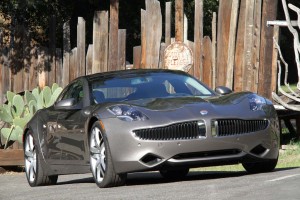The newly reborn and now Chinese-owned Karma Automotive has signed a major powertrain deal with BMW, the German automaker set to provide key components for the plug-in hybrid soon set to go back into production.
Karma is the new name for what was originally known as Fisker Automotive, the California-based start-up that collapsed into bankruptcy in 2013. The deal with BMW allows it to replace the old 2.0-liter engine provided by General Motors for the original version of the Fisker Karma plug-in.
The deal “is giving Karma Automotive the opportunity to bring a stunning car back to the market, and the partnership with BMW and their outstanding track record is a great fit for the future,” said Karma CEO Tom Corcoran. “We will continue to develop beautiful cars with the latest cutting edge hybrid and EV technology.”
That comment suggests that Karma plans to move ahead and add new products, rather than just rely on Fisker’s original plug-in. At the time it went belly-up, the California start-up was trying to develop a second model, the smaller and more affordable Fisker Atlantic. While a prototype was mocked up, development work on its powertrain was never completed.
Chinese automaker, the Wanxiang Group, purchased Fisker out of bankruptcy and has been hinting that it would like to grow it beyond the original Fisker Karma line.
(Reborn Fisker Automotive hopes to achieve better Karma with name change. For more, Click Here.)
That sleek battery sports car won rave reviews for its styling, but was criticized for a powertrain which relied on the 2.0-liter GM inline-four. It tended to be rough riding and didn’t have the level of refinement expected of a vehicle topping $100,000.
Even before its bankruptcy, Fisker was reportedly negotiating to replace the gasoline side of its driveline with a BMW alternative.
(Click Here to check out the new Tesla Model X battery-SUV.)
What it has coming, however, neither BMW nor Karma are saying, other than noting the deal will include “high voltage battery charging systems and a wide range of hybrid and EV systems.” That leaves open the possibility BMW could provide essentially the entire plug-in hybrid system, not just the internal combustion range-extender portion of the powertrain.
BMW clearly has some tools in its kit to draw from. It already produces the plug-in hybrid i8 sports car, as well as the battery-electric i3. The latter, a pint-sized city car, can be ordered with an optional range-extender gas engine. BMW also has hybrid versions of a number of its mainstream models, with a number of those set to get plug-in options, as well, over the next few years.
(Mercedes takes aim at Tesla with 311-mile battery SUV. Click Here for the story.)
While Henrik Fisker, the Danish designer who co-founded the eponymous Fisker Automotive, is no longer involved in the company, his one-time partner Bernard Koehler, is linked to the revival. In a statement issued by Karma Automotive, he said, “I’m personally excited and incredibly proud we will be integrating the sophistication, integrity and character of the BMW powertrain into our own. Karma Automotive products and ultimately our customers will be the greatest benefactors of this fantastic relationship.”



There is nothing wrong with the GM I-4 Ecotech engine which is a robust and fully capable engine. The engine has nothing to do with the vehicle ride quality…
BMW’s engine is not going to save this ill conceived second, third or twentieth attempt to sell an over priced, impractical, unreliable, poor performing ugly duckling. Let’s see how consumers vote with their wallets.